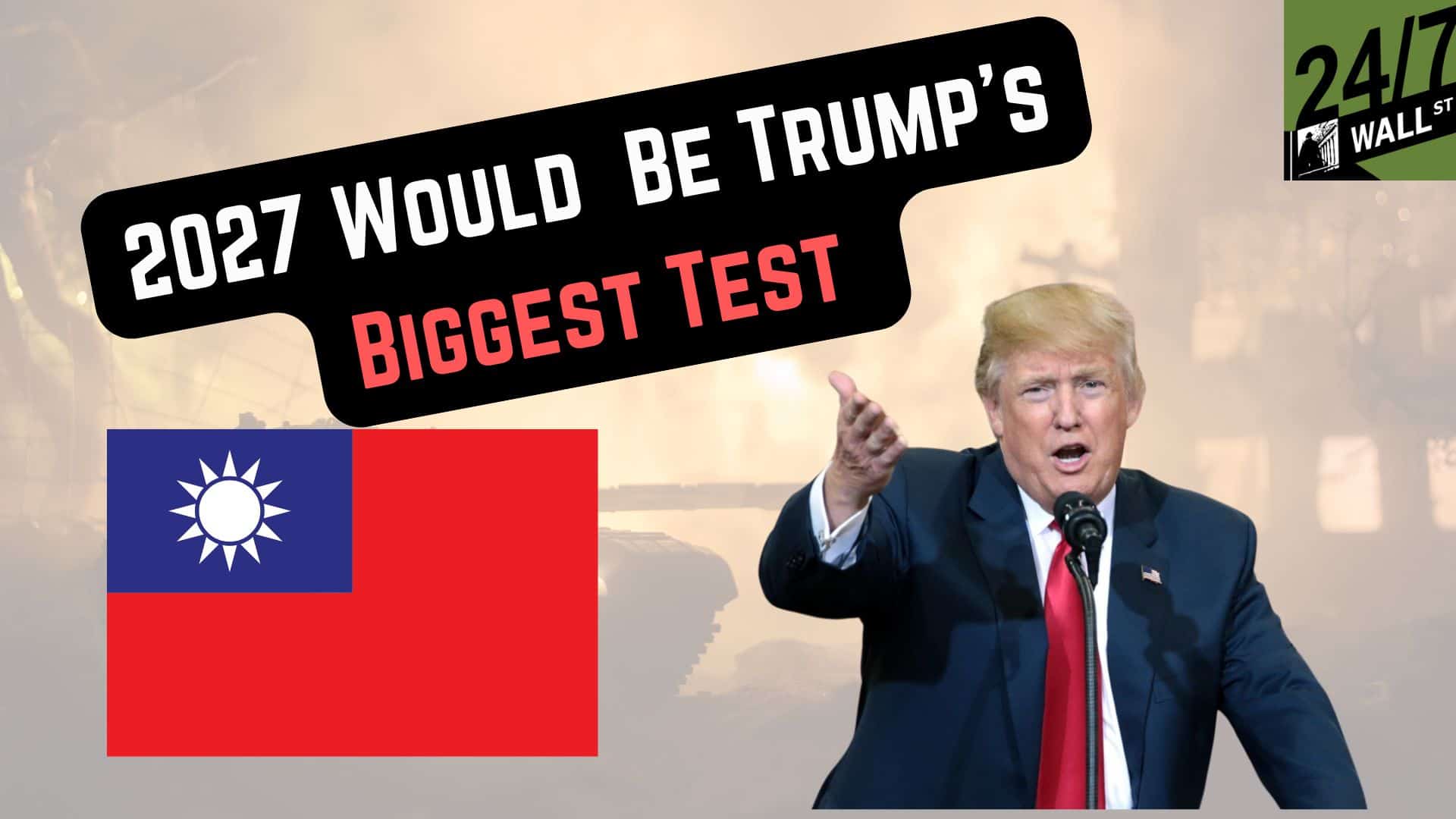
Key Points:
- Trump is favored in Taiwan for his tough stance on China.
- He may expect more from Taiwan for continued U.S. support.
- A Trump victory could shift U.S. policy from strategic ambiguity to a more assertive approach.
- Smart investors are already planning ahead to 2025 and placing bets on “the next Nvidia”. You can see for yourself here.
Austin Smith and Michael Muir delve into the potential implications of a Trump victory for Taiwan, particularly in light of growing tensions with China. Michael notes that China aims to be ready to take Taiwan by 2027, but this timeline is speculative. Trump was viewed favorably in Taiwan during his first term due to his supportive stance on Taiwanese independence and a strong posture against China. However, Michael suggests that Trump’s current campaign rhetoric shows a hardening attitude toward Taiwan, criticizing its defense efforts and dominance in the semiconductor industry. While Trump’s approach might become more transactional, demanding more from Taiwan in exchange for U.S. support, it’s unclear how much of a departure this would be from his previous stance. They also briefly touch on the Biden administration’s Chips Act as a sign of continued U.S. assertiveness towards China.
Transcript:
Okay, so Michael, we’ve talked a little bit about what a Trump victory would mean for NATO, what it would mean for Ukraine.
Now, let’s talk about sort of the ultimate endgame here.
What would it mean for Taiwan?
A lot of people have talked about the Russian invasion in Ukraine as a bit of a dress rehearsal, geopolitically speaking, for China, Taiwan, and the building tensions there.
What do we expect that a Trump victory would mean for Taiwan?
All suffice to say, this is speculation, and we’re making our best educated guess here.
What would we expect based on what we’ve seen so far?
Sure. Well, I think the first thing we want to mention is, as you said, this is speculation, but it’s based on intelligence reports that China is preparing to be ready to take Taiwan.
They should have the capability by around 2027.
Now, we should be careful to point out that doesn’t mean January 1st, 2027, we’re going to see masses of landing craft crossing the Taiwan Strait.
There’s no guarantee there.
It’s just they want to be ready by then to press that claim if necessary or if feasible, I should say.
Trump and Taiwan is an interesting one because internationally, Trump isn’t terribly well regarded in most other countries, but Taiwan is actually a bit of an exception.
In polling for who was the preferred victor in 2020, Taiwan kind of bucked the trend by saying they wanted Trump to win.
And that was a reflection of his conduct during his time as president, which was broadly supportive of Taiwan and Taiwanese independence.
Which is going against established protocol between America and Taiwan, which has been in place since 1979.
So the current policy is one of strategic ambiguity.
As the name implies, the U.S. is basically trying to have it both ways, vis-a-vis China and Taiwan.
So with China, the U.S. adheres to the One China policy.
It doesn’t officially support independence for Taiwan.
But at the same time, it provides aid for Taiwan to defend itself against the country it’s supposed to be a part of.
So it’s supposed to be opaque. It’s supposed to be murky because what the U.S. is banking on is maintaining ties with China, an important trading partner, of course, but at the same time having a de facto independent ally in the Pacific to contain Chinese expansion.
So there’s a lot of layers.
I mean, so like in recent public statements, Joe Biden said, I don’t support Taiwan being independent, but I also don’t support a forcible change in the status quo.
So for Beijing, they don’t know what America is going to do next.
And that’s kind of the point.
But what we’re seeing and what we could see in the next four years is will strategic ambiguity still work?
Does the U.S. need to adopt a more assertive posture with the associated risks?
So while Taiwan has generally regarded Trump well during his first term as president, what we’re seeing on the campaign trail is kind of a hardening of his attitude towards Taiwan and getting into that kind of transactional approach that he seems to have with regard to dealing with other countries.
So his accusations have been that Taiwan isn’t doing enough to bolster its defenses.
He’s been critical of Taiwan’s dominance in the semiconductor industry.
So I don’t think it’s going to be a sharp departure.
I just think that he’s going to be demanding more in exchange for continued American support of Taiwan’s position.
Yeah, you know, it’s interesting when we think about Trump’s posture on Taiwan.
You mentioned he was maybe favored because of his early first presidential candidacy.
And Trump demonstrated to his credit in Taiwan’s favor, you know, a real willingness, a strength against China with sanctions and tariffs on sanctions.
Which probably had Trump sort of stand out and seemed like he was willing to stand up to China, which Taiwan would prefer.
However, we also maybe see something interesting with the Biden and Harris administration passing the Chips Act and, you know, maybe at least demonstrating a similar willingness to continue that, you know, an aggressive stance against China.
So let’s shift.
Travel Cards Are Getting Too Good To Ignore (sponsored)
Credit card companies are pulling out all the stops, with the issuers are offering insane travel rewards and perks.
We’re talking huge sign-up bonuses, points on every purchase, and benefits like lounge access, travel credits, and free hotel nights. For travelers, these rewards can add up to thousands of dollars in flights, upgrades, and luxury experiences every year.
It’s like getting paid to travel — and it’s available to qualified borrowers who know where to look.
We’ve rounded up some of the best travel credit cards on the market. Click here to see the list. Don’t miss these offers — they won’t be this good forever.
Thank you for reading! Have some feedback for us?
Contact the 24/7 Wall St. editorial team.





